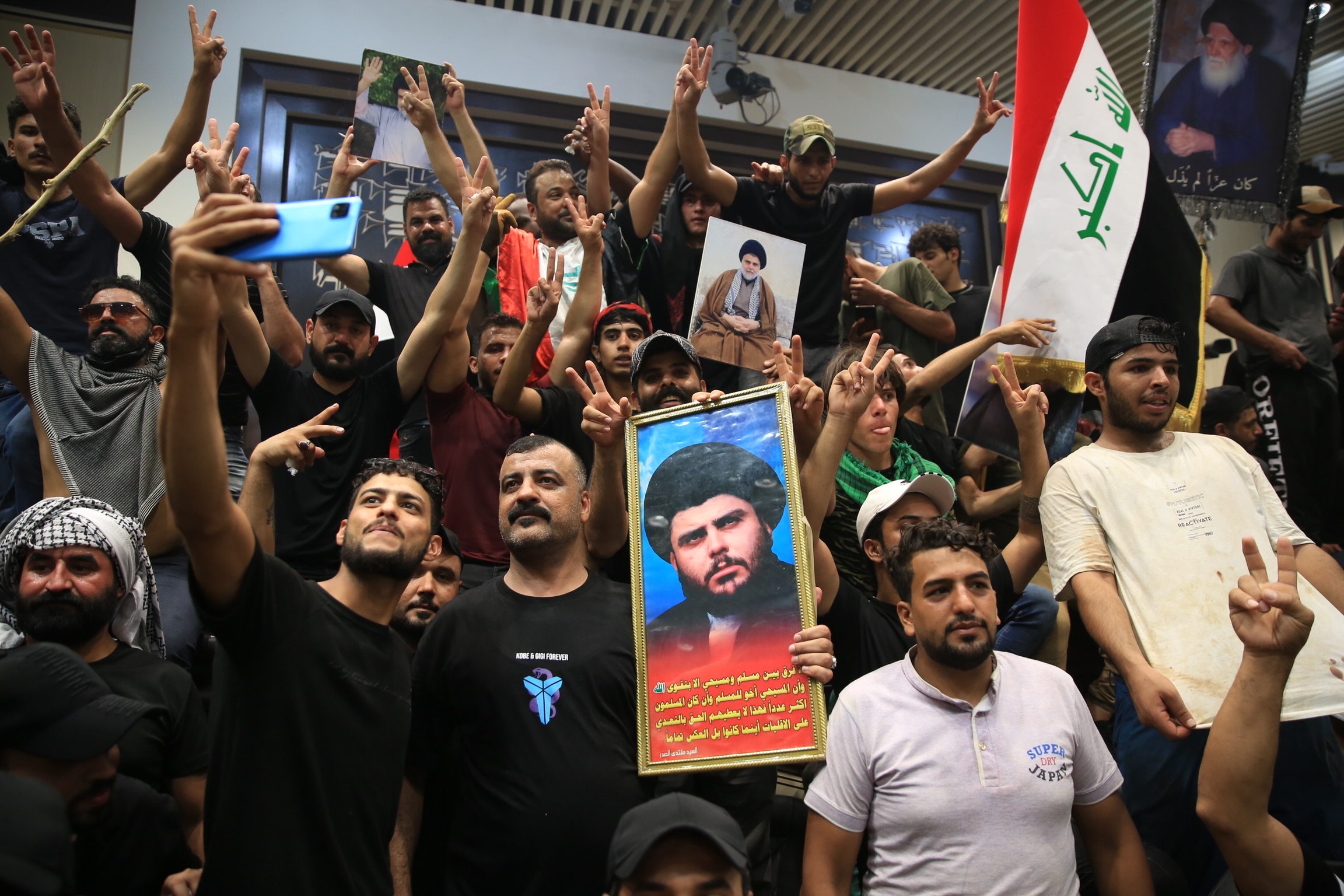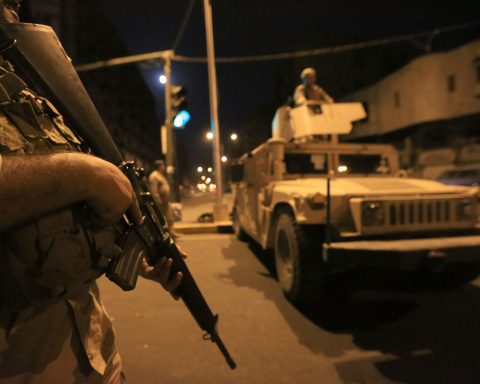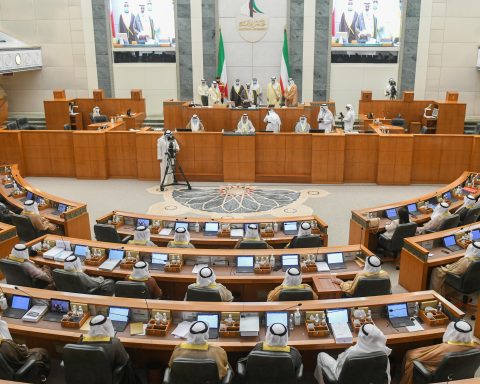Within 72 hours, loyalists of firebrand Shia cleric Muqtada al-Sadr pulled down the walls of the heavily fortified Green Zone, home to Iraq’s government buildings and foreign embassies, twice. Moreover, they stormed into the Iraqi parliament to thwart the selection of Mohammed Shia al-Sudani for prime minister by the Shiite Coordination Framework (SCF), a group of Shiite Iran-backed parties headed by former Prime Minister Nouri al-Maliki.
The threat of escalation underscored the worsening political turmoil in Iraq, in which the country has been unable to form a new government despite nearly ten months passing since the nationwide election. Furthermore, after the protests in Baghdad, al-Sadr’s archenemy al-Maliki’s appearance with a rifle brought concerns of intra-Shia conflict.
Al-Sadr’s power to freeze politics
Mass mobilization is a well-worn strategy/ability of al-Sadr, who was once a militia leader who waged deadly battles with the US-led coalition from 2004-2008. Furthermore, focusing his narrative against foreign imperialism, failed governments, rampant corruption and an unjust political landscape, he orchestrated large-scale protests in 2015, 2017, 2019, and 2020. As a matter of fact, saying “Your message is received,” to his followers that stormed parliament on July 27, al-Sadr said, “You terrified the corrupt,” in reference to his rivals.
The last show seems to be al-Sadr’s effort to remind his political and sociological power again. Sadrists came first in the parliamentary elections in October 2021. After failing to form the “national majority government” with the Kurdistan Democratic Party (KDP) and Sunni blocs due to disagreement with the SCF, he ordered his 73 MPs to withdraw from parliamentary politics in June. Becoming the largest bloc in parliament following the Sadrists’ withdrawal, the SCF established a commission to determine al-Sudani as its candidate for prime minister. Despite Kurdish parties’ disagreements over the presidential candidacy, the SCF’s decision to convene the parliament on July 30 to elect a president seems to have forced al-Sadr to take a preliminary step.
In addition, the decision of the Federal Supreme Court on “the quorum [to elect the president] is achieved in the presence of two-thirds of the total number of members of the total parliament” disrupted al-Sadr’s plans to form a government. The process of forming a government cannot begin without the election of the President. He even pointed out that the Court had received instructions from Iran requesting the Court to be changed. In fact, one of the targets of the second raid on the Green Zone was the Court building.
Al-Sadr supporters carried out the raid to show they would not consent to the undesirable prime minister. Despite the withdrawal from parliamentary politics, al-Sadr shows that he could direct and even freeze parliamentary politics with the politics of his followers on the street. In this context, even if the SCF were able to succeed, al-Sadr would remain to have significant power in the Iraqi political scene.
End of al-Sudani’s hope?
Although al-Sudani can be considered a reasonable candidate, a perception of “al-Maliki’s man” exists in the social and political arena. Once a member of the Dawa Party led by al-Maliki, al-Sudani’s most ministerial term was during al-Maliki’s premiership. In fact, having no problem with al-Sudani, al-Sadr’s real discomfort is that al-Maliki is a visible actor in the political scene. Although a former member of al-Maliki’s State of Law bloc, al-Sudani has served as the founding head of the Al-Fouratain Movement and adopted a new political discourse since January 2021, seeming to have fallen victim to al-Sadr’s opposition to al-Maliki.
After the anti-government protests that broke out in October 2019, al-Sudani’s name was mentioned among the possible successors of Adil Abdul-Mahdi, who stepped down in May 2020. Protesters had set fire to al-Sudani’s house in Maysan on the grounds that he was al-Maliki’s man. Any name close to al-Maliki, one of the architects of the Shiite-Sunni tension and thus a reason for the rise of ISIS, may not be wanted by the protesters. Furthermore, Iran seems unsatisfied with al-Sudani’s candidacy. Iran’s Quds Force commander, Esmail Qaani, visited Baghdad on July 27 to contain the escalating tension between al-Maliki and al-Sadr, who recently has been known for his anti-Iranian discourse.
Al-Sudani may still be the most plausible candidate the SCF has to offer. However, his political future depends on his ability to convince al-Sadr and the protest movement that he is not “al-Maliki’s man.” Although the SCF insists on al-Sudani, both streets and al-Sadr’s harsh attitude push al-Sudani’s candidacy to failure. In this context, Sadrists may spread their protests further, and the process may even evolve into a confrontation with militias belonging to rival Shiite groups.
Shia leadership struggle vs intra-Shia conflict
The struggle for “absolute Shiite leadership” continues between al-Sadr, National Wisdom Movement leader Ammar al-Hakim, and al-Maliki. Hadi al-Amiri, the leader of the pro-Iran Fatah Alliance, has also joined this struggle. These Shiite actors outcall in the fight against al-Sadr with the support of Iran. However, with the latest move, al-Sadr has redisplayed that he will not give up to act as an absolute Shiite leader in the country.
In the audio recordings allegedly belonging to al-Maliki, leaked to social media on July 13, al-Maliki accuses al-Sadr of receiving once arms from Iran and being a British agent. Al-Maliki wanted the premier post for himself, but audio recordings effectively sank his candidacy. Indeed, the encounter between the two actors would have been more challenging. Since both the audio recordings and al-Maliki’s appearance with a rifle on July 27 can be considered a “declaration of war” against al-Sadr, it is understood that the tension between both will continue. Remembering that al-Maliki waged attacks against al-Sadr during his premiership, the repetition of the fight between the Shiites has dangerous consequences this time. Despite more than a hundred wounded, pro-Iranian Shiite leaders have issued statements calling al-Sadr to return to dialogue at the insistence of Sadrist protesters. If the protests continue and al-Sadr’s supporters take up arms, fierce fighting ensues.
In other words, al-Sadr does not allow al-Maliki or any candidate that al-Maliki supports to become prime minister. Thus, al-Maliki’s pursuit of Shiite leadership was also targeted. Although al-Maliki’s posing with a rifle created an intra-Shia civil war concern, al-Sadr, who aims to be the most powerful actor in Iraq’s future, would never target to wage a civil war. Also, both society and Shia religious authority in Najaf will reject any scenario of a Shia-Shia conflict. Indeed, in his statement after the parliamentary raid, Sheikh Abdul Mahdi al-Karbalaei -representative of Iraqi top Shiite cleric Ayatollah Sistani – urged all people to live at peace with each other. Even if the current stalemate ends in the near term, the struggle to lead the “house of Shia’ is far from over.
A new election ahead?
It is uncertain whether the SCF will be successful in forming a government. According to the Iraqi political order since the 2003 occupation, Kurds, Sunnis, and Shiites shared the presidency, parliament speaker, and prime ministry, each chosen among these groups. There is no consensus on the presidential candidate between the KDP and the PUK that acts together with the SCF. Furthermore, al-Sadr’s allies KDP and Sunni leader Mohammed al-Halbousi have not yet taken a firm stand on al-Sudani’s candidacy.
Paralyzing the political landscape with his last moves, al-Sadr does not want his rivals to form a government that he could not succeed to form. As a matter of fact, in the second raid of the parliament, the message was “dissolution of the parliament”. In this context, if al-Sadr’s stance does not soften, the government formation crisis that has been going on for about ten months is likely to continue. Also, early elections loom on the horizon. Moving from crisis to new crisis, Iraq seems to face alarming uncertainty.














